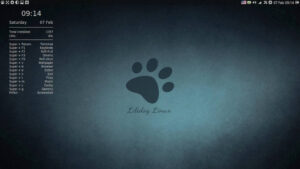Last updated on July 17, 2023
On Thursday, the AlmaLinux Foundation made public its plans to continue to develop and maintain its RHEL clone without access to Red Hat’s source code.

Unless you’ve been living under a rock, you probably know by now that Red Hat is restricting access to Red Hat Enterprise Linux source code. Only paying customers now have access, and they’re forbidden by contract to pass that code on to others outside of their respective organizations. This has left the downstream distributions that provide clones of RHEL scrambling to figure out work-arounds for building their distros without access to Red Hat’s source code.
This basically affects three large distributions with large enterprise user bases: Rocky Linux, AlmaLinux, and Oracle’s Unbreakable Linux. There are others, but these three have huge user bases.
Almost immediately after Red Hat made its new policy known, the owner of Rocky Linux, Gregory Kurtzer, announced that Rocky developers would be mining RHEL source code from various sources, including from instances of RHEL that are available on public clouds.
While Rocky Linux’s approach appeared to me to be “fraught with legal issues” (which I said in an earlier version of this article), Kurtzer told FOSS Force it isn’t.
“The clouds do not require a click through agreement to obtain the sources, neither do the UBI images,” he told us in a comment on LinkedIn. “The Rocky Linux legal advisors reviewed our plan and it is not ‘fraught with legal issues.'”
“Most importantly, we remain absolutely committed to our promise to the enterprise Linux community,” he added. “Rocky Linux 8 and 9 will remain to be bug-for-bug compatible with RHEL.”
Oracle announced on Monday that it would be taking a “close enough” approach — that its RHEL stand-in would no longer be bug-by-bug compatible, but that it would still be close enough to RHEL to be largely compatible.
Yesterday, AlamaLinux (the distro that powers FOSS Force) announced that it would be taking a similar approach to Oracle.
“After much discussion, the AlmaLinux OS Foundation board today has decided to drop the aim to be 1:1 with RHEL,” benny Vasquez, board chair at the AlmaLinux Foundation said in a statement that was published on the distro’s website. “AlmaLinux OS will instead aim to be Application Binary Interface compatible.”
Specifically, according to notes taken at the meeting on July 12, the board said, “We will continue to aim to produce an enterprise-grade, long-term distribution of Linux that is aligned and ABI compatible with RHEL in response to our community’s needs, to the extent it is possible to do, and such that software that runs on RHEL will run the same on AlmaLinux.”
Negligible Effect on AlmaLinux Users
According to Vasquez, this change should have little to no effect for the average AlmaLinux user, and might results in even timelier bug fixes in some cases.
“The most remarkable potential impact of the change is that we will no longer be held to the line of ‘bug-for-bug compatibility’ with Red Hat, and that means that we can now accept bug fixes outside of Red Hat’s release cycle,” Vasquez said. “While that means some AlmaLinux OS users may encounter bugs that are not in Red Hat, we may also accept patches for bugs that have not yet been accepted upstream, or shipped downstream.”
She also said that the changes necessitated by no longer having access to Red Hat’s source code will result in changes to the distro’s development process.
“One of the first things you will see is that we will include comments in our patches that include a link to where we got the patch that’s been applied,” she said. “This change is helpful for several reasons, but it helps us specifically further our goal of transparency.
“We will also start asking anyone who reports bugs in AlmaLinux OS to attempt to test and replicate the problem in CentOS Stream as well, so we can focus our energy on correcting it in the right place,” she added.
While Vasquez is correct in saying that the changes to the way AlmaLinux is being developed will have little to no effect on the vast majority of the distro’s users, there are some enterprise users in highly regulated areas (the financial sector, for example) who might not be able to continue using AlmaLinux if it’s no longer line-by-line copy of an approved distro such as RHEL.
SUSE to the Rescue?
The problems that the RHEL clones are facing might eventually disapper, however, if plans spelled out by SUSE bear fruit.
The Germany-based SUSE is one of Red Hat’s biggest competitors in the enterprise Linux arena, and on Tuesday the company’s newly minted CEO Dirk-Peter van Leeuwen (who came to the table as a 17-year Red Hat veteran) announced that the company is pledging to spend $10 million to fork RHEL and to create a foundation to maintain it. When it happens, the forked code will be freely available to the public.
Already Rocky Linux has signed on to be part of SUSE’s project. There’s been no news on whether AlmaLinux will also get onboard.
Editor’s note: An earlier version of this article said that in order for Rocky Linux to access RHEL source code on public clouds they would have to click through an end user license agreement from Red Hat that would forbid the distro to distribute Red Hat’s code. According to Rocky Linux’s owner, Gregory Kurtzer, that is not the case.
Christine Hall has been a journalist since 1971. In 2001, she began writing a weekly consumer computer column and started covering Linux and FOSS in 2002 after making the switch to GNU/Linux. Follow her on Twitter: @BrideOfLinux








